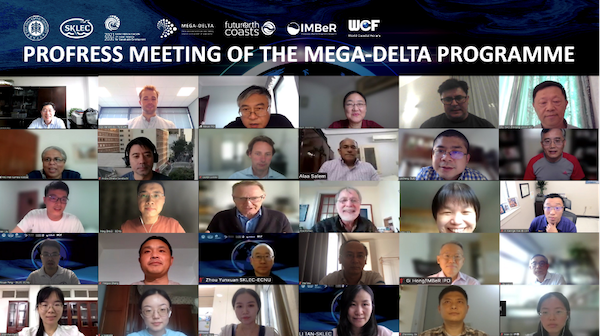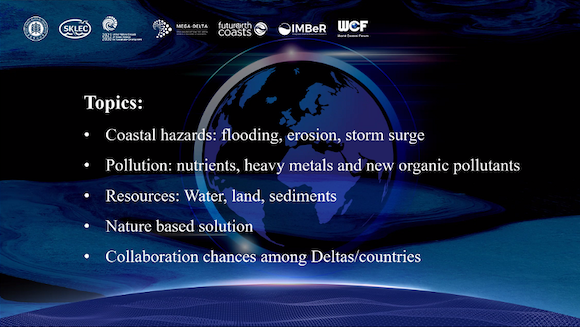进展交流会线上举行
Progress meeting of the UN Ocean Decade “Mega-Delta Programme” held online
2022年6月7日,由华东师范大学河口海岸学国家重点实验室举办的“大河三角洲计划年度进展交流会”在线上顺利召开。来自中国、荷兰、英国、巴基斯坦、巴西、埃及、美国、加拿大的14位专家作了专题报告,80多位各国学者参加了会议。河口海岸学国家重点实验室主任何青教授致欢迎辞。
The progress meeting of the Mega-Delta Programme, hosted by the State Key Laboratory of Estuarine and Coastal Research (SKLEC), East China Normal University, was held online on June 7, 2022. Fourteen scientists from China, the Netherlands, UK, Pakistan, Brazil, Egypt, USA, and Canada presented their progress in research, and more than 80 participants from all over the world attended this meeting. Prof. Qing He, Director of the State Key Laboratory of Estuarine and Coastal Research, delivered a warmly welcome speech.
何青主任在致辞中提到,三角洲地区受到流域来沙减少、污染物输入、海上风暴潮,以及本地地面沉降、土地围垦、洪涝灾害频发等多重环境压力,急需通过多学科交叉、多部门协作,更好地保护大河三角洲地区的人类生存环境。联合国海洋十年“大河三角洲计划”旨在推动三角洲区域可持续发展,核心研究目标包括:了解全球大河三角洲的现状,探讨全球气候变化和人类活动影响下的三角洲演化机制,预测未来水-沙变化和社会经济发展趋势以及灾害预警,针对海平面上升、海岸侵蚀、洪涝灾害、盐水入侵、水土污染、生态系统退化等共性问题提供解决方案。
何青主任介绍了联合国海洋十年“大河三角洲计划”自2021年6月签约一年来的工作进展。首先是携手合作伙伴制定了该计划的实施方案,并建立了网站。2021年8月,召开了线上启动会;10月,“海上丝路”河口海岸国际联合实验室获得上海市“一带一路”国际合作项目资助,与来自孟加拉国(恒河三角洲)、巴基斯坦(印度河三角洲)、埃及(尼罗河三角洲)和罗马尼亚(多瑙河三角洲)的合作伙伴率先开展合作研究。同时,成功获批科技部“一带一路”创新人才交流外国专家项目“脆弱大河三角洲可持续发展的挑战和对策”,与巴基斯坦合作伙伴开展合作研究。团队还与SCOR-China、Future Earth Coasts、全球滨海论坛(WCF)、Coastal-SOS项目、GEF-FAO河口项目等密切合作,扩大影响。团队成员还收集了主要三角洲的相关科学数据,未来将建立在线数据库,与合作伙伴共享。“大河三角洲计划”科学指导委员会、咨询委员会、执行委员会也在陆续成立和规划中。
作为“大河三角洲计划”的发起单位,华东师范大学河口海岸学国家重点实验室举办本次“大河三角洲计划进展会议”,旨在交流各伙伴三角洲项目最新进展,对河口海岸三角洲区域的可持续高质量发展具有十分重要的意义。
Prof. Qing He congratulated the opening of the progress meeting of the Mega-Delta Programme. She mentioned that the world deltas are under great pressures such as reduced sediments and excessive nutrients inputs from the catchment, frequent storm surges from the sea, as well as land subsidence, reclamation and flooding at the deltas. In response to these global issues, the Mega-Delta Programme of UN Ocean Decade aims to support sustainable development in delta regions associated with large rivers, through collaboration among different disciplines and stakeholders. It plans to understand the current status of global river deltas, explore the mechanisms of delta evolution under the influence of global climate change and human activities, predict future trends of water-sediment and socio-economic evolution, as well as early warning for hazards, and provide solutions for common problems, such as sea level rise, coastal erosion, flood disasters, salt water intrusion, soil and water pollution, and ecosystem degradation.
Prof. Qing He briefly introduced the development of the Mega-Delta Programme since its endorsement by the UN Ocean Decade in June 2021. The implementation plan was developed with the partners, and the official website for the "Mega-Delta Programme" was set up. In August 2021, an online kick-off meeting for the Mega-Delta Programme was held. In October 2021, the “International Joint Laboratory on Estuaries and Coasts” was approved by the Shanghai government to conduct collaborative research with partners in Bangladesh (Ganges Delta), Pakistan (Indus Delta), Egypt (Nile Delta) and Romania (Danube Delta). At the same time, a Sino-Pakistan joint research project was also granted by the Ministry of Science and Technology, China. In addition, the Mega-Delta Programme is also actively interacting with other partners, such as SCOR-China, Future Earth Coasts, World Coastal Forum, Coastal-SOS project and GEF-FAO Estuary project etc. Scientific data for major river deltas has been collected and will be archived online for share with partners. Scientific Steering Committee, Advisory Committee and Executive Committee are also in planning.
As the leading institute of Mega-Delta Programme, the State Key Laboratory of Estuarine and Coastal Research in East China Normal University (ECNU) decided to hold this meeting aiming to promote understanding of the partner deltas of Mega-Delta Programme and introduce new progress in scientific research. Therefore, this symposium is of great significance for the sustainable development of world deltas.
2022年6月8日为第十四个“世界海洋日”暨第十五个“全国海洋宣传日”。此次海洋日主题为“保护海洋生态系统 人与自然和谐共生”。契合本年度“海洋日”主题,本次会议对大河三角洲目前面对的环境压力进行了深入讨论。
The 14th World Oceans Day, on 8 June 2022, highlights the theme “Revitalization: Collective Action for the Ocean”. In line with this theme, the progress meeting of Mega-Delta Programme conducted in-depth discussions on the pressures that deltas are faced with.
自然资源部第一海洋研究所乔方利研究员介绍了潮汐混合在海岸上升流形成中起到的关键作用;中山大学吴加学教授汇报了近岸海水发生季节性缺氧的位置和原因,以及细颗粒泥沙再悬浮对缺氧程度的影响机制。美国路易斯安那州立大学Z. George Xue副教授介绍了基于墨西哥湾-密西西比河系统的区域地球系统模拟平台Gulf-COAWST对墨西哥湾飓风引起的藻华、低氧、海岸侵蚀等开展的模拟研究。
Prof. Fangli Qiao from the First Institute of Oceanography, Ministry of Natural Resources, China introduced about the new mechanism of coastal upwelling system induced by tidal mixing, which is a key process for sediment dynamics and marine ecosystems. Prof. Jiaxue Wu from Sun Yat-sen University reported why coastal hypoxia is persistent in the coastal patchy waters, demonstrated locations where seasonal hypoxia frequently occurs, and how fine particle resuspension affects hypoxic levels. Dr. Z. George Xue from Louisiana State University introduced about the Gulf-COAWST, a regional earth system modeling platform and its applications for the Mississippi- Gulf of Mexico system.
南京大学高抒教授和华东师范大学郭磊城研究员以长江三角洲、恒河-布拉马普特拉河三角洲等为例,揭示了人类活动和潮汐作用对三角洲地区海岸和地面高程的调节作用;美国北卡罗来纳州立大学Paul Liu(刘敬圃)教授通过湄公河和伊洛瓦底江三角洲的案例研究,报告了亚洲主要三角洲面临的挑战,如地面沉降、红树林锐减、盐水入侵、采砂、岸滩侵蚀等。英国赫尔大学Daniel R. Parsons教授的报告进一步揭示了湄公河三角洲泥沙供应、河道采砂和三角洲可持续发展之间的关系,指出潮汐上延的主要原因是人类活动造成的泥沙减少,导致河床下降。
Prof. Shu Gao from Nanjing University and Prof. Leicheng Guo from East China Normal University presented the human and tidal effects on the Changjiang Delta and Ganges-Brahmaputra River Delta in the Anthropocene. Prof. Paul Liu from North Carolina State University reported the challenges that Asian major deltas are facing with case studies from the Mekong and Irrawaddy deltas, such as land subsidence, mangrove reduction, saltwater intrusion, sand mining and coastal retreat. Prof. Daniel R. Parsons from the University of Hull reported the relationship between sediment supply, sand mining and delta sustainability, and pointed out that channel bed-level lowering induced by anthropogenic sediment starvation is the primary factor driving tidal extension upstream in the Mekong delta.
巴基斯坦国家海洋研究所Samina Kidwai所长对2009年至今在印度河三角洲开展的科研项目和面临的问题进行了介绍,包括印度河三角洲的侵蚀、红树林退化和渔业资源减少等压力。埃及谢赫村大学Alaa Salem教授报告了人为因素对尼罗河三角洲沿岸泻湖的影响,认为排水和开垦导致了1972-2019年泻湖面积的萎缩和渔业资源的减少。两个位于季节性干旱区的三角洲也都面临着流域筑坝导致的来水来沙减少问题。
Dr. Samina Kidwai, Director of the National Institute of Oceanography, Pakistan introduced about the research programs since 2009, and challenges faced at the Indus River Delta, such as coastal erosion, mangrove degradation and decreased fishery production. Prof. Alaa Salem from Kafrelsheikh University presented the anthropogenic impact on the coastal lagoons of Nile Delta, and considered that water drainage and reclamation induced the shrinkage of lagoons (1972-2019), as well as reduction of fish resources. Both deltas are faced with reduced sediment and water input from the catchment due to damming.
巴西圣保罗大学地球科学研究所Andre Oliveira Sawakuchi副教授对亚马逊河流域由于森林采伐、筑坝和气候变化造成的环境影响进行了介绍。
A. Prof. André Oliveira Sawakuchi from the Institute of Geosciences of Universidade de Sao Paulo reported the past and present changes of environment and climate in the Amazon River basin, under the pressures from deforestation and damming.
荷兰水利局海岸洪水风险管理首席顾问、荷兰代尔夫特大学讲师Quirijn Lodder博士介绍了泥沙管理对莱茵/默兹河三角洲砂质海岸适应海平面上升的作用。代尔夫特理工大学Gijs Hendrickx博士报告了基于自然的减少盐水入侵解决方案,以及不同自然因素对于减少盐水入侵的效果。加拿大地质调查局贝德福德海洋研究所Donald Forbes研究员介绍了在环北极地区气候变暖背景下,马更些河三角洲管理短期洪水和长期淹水的经验。英国南安普顿大学Ian Townend教授介绍了海岸恢复力的管理理念。这些理论和管理经验可以为其它三角洲地区提供很好的借鉴。
Dr. Quirijn J. Lodder, the principal adviser on coastal flood risk management at Rijkswaterstaat, Ministry of Infrastructure and Water Management, the Netherlands, and external lecturer of Delft University of Technology, introduced the sediment management as an adaptation strategy for the sandy coast of the Rhine/Meuse delta to sea level rise. Dr. Gijs Hendrickx from Delft University of Technology reported nature-based solutions to mitigate salt intrusion and its effects. Prof. Donald Forbes from the Geological Survey of Canada, Bedford Institute of Oceanography, presented the Management of short-term flooding and long-term inundation in a large Arctic river-mouth system, Mackenzie Delta, Canada. Prof.Ian Townend from University of Southampton reported a management concept of coastal resilience. The management strategies can provide good examples for other deltas with similar problems.
研讨会主题报告结束后,与会学者对大河三角洲计划的推进进行了热烈讨论,认为未来有必要开展在水灾害、泥沙资源管理、碳埋藏、微塑料等领域开展更进一步的合作,使不同三角洲之间可以互相借鉴,避免重蹈覆辙。同时,部分学者建议将研究的范围扩大到俄罗斯北极沿岸、格陵兰岛,以及尼日尔河三角洲、刚果河口等地区。
At the end of the meeting, a warm discussion session was held. Participants agreed to develop further collaborations in the management of hazards and resources, carbon sequestration and micro-plastics, etc. The most important purpose is to avoid potential problems which has already existed in other deltas. In the meanwhile, some of the scientists suggest to expand the programme to places such as the Russian deltas along the Arctic coast, Greenland, Niger River Delta, and Congo Estuary.


